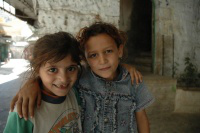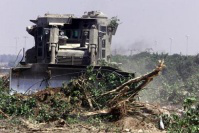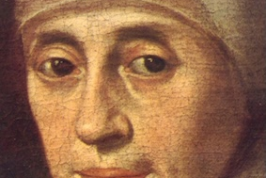Holy Land: report highlights impact of conflict on children

Wiki images. Palestinian girls, picture by Justin McIntosh, August 2004
'What CPT observes here in Al-Khalil is that children, both Palestinian and Israeli, are not being brought up in a spirit of love'. Christian Peacemaker Teams have a permanent presence in the Holy Land. Over the last four months one group has compiled data to highlight issues faced by communities in the Old City, the village of Al-Bweireh on the outskirts of the city and the Baqa Valley.
SERIOUS INCIDENTS AND REFLECTIONS
CPT keeps a log of 'Serious Incidents', which CPT has defined based on the requests of UNICEF and the American Consulate (i.e. situations where violent acts were perpetrated or there was a denial of humanitarian need). Examples of denial to Humanitarian Access include things such as property damage to Palestinian crops, checkpoints en route to educational institutions, or denial of access to water. This section highlights the serious incidents CPT witnessed recorded from June-September 2010 and places the incidents in the context of Palestinian daily life in the Hebron area.
CONSEQUENCES FOR SETTLERS/SOLDIERS
Of the 37 serious incidents CPT recorded over the four month period, the large number perpetrated by settlers, based on past experience, was not much of a surprise to CPT. However, the number of incidents perpetrated by soldiers was of great concern. Israeli soldiers have been granted the power of jurisdiction of law in the occupied territories. Concern, that a group of people, granted power by the state is utilizing it to further oppress the Palestinian population. According to IDF standards they are to avoid at all costs damage to human life, dignity and property. It is based on our presence and observation that the Israeli army does not adhere to this ethical standard; in fact, it continues to further create an impossible situation for the Palestinian population.
Perpetrators of Serious Incidents
In all record cases of violence, destruction of property or limited/denied access to humanitarian needs, CPT and other internationals witnessed no consequences for soldiers or settlers exerting violence. Furthermore, in cases of damaged property the Israeli police were unwilling to investigate settlers' involvement. In one particular incident in which Palestinian grape vines were found ripped out of the ground, the police refused to follow up on Palestinian owners' claims that settlers had destroyed the vines.
As the Israeli police operating in the area are required to be neutral parties, it is their duty to take statements and investigate claims, whether made by Palestinians or Israelis. By refusing to follow up on claims made by Palestinians, the police relinquish their impartial role and become themselves participants in the violent acts they are required to police and prevent.
THE ROLE OF CHILDREN
In addition to recording the perpetrators of serious incidents in the Hebron area, CPT has also detailed the consequences for children, both Israeli and Palestinian. The chart pictured includes both the direct and indirect involvement of children. Direct incidents are defined as incidents in which children were either witnesses or direct recipients or perpetrators of violence. CPT defines indirect incidents as acts of violence which affect children regardless of their presence to the actual incident. For example, when crops are damaged by settlers, CPT obtains information on the family who owns the crops, including the number of family members under the age of 18. The destruction of crops results in families not being able to meet basic needs. It is understood that peoples under the age of 18 are recognized by international law as children. As they are internationally recognized as not being fully developed adults, they must be protected from parties that seek to harm them.
Children Affected by Serious Incidents - The Ibrahimi School
This incident is a microcosm of the forms of violence that continually take place in Al-Khalil. On 22 September, a local business man alerted three CPTers to a group of soldiers outside the Ibrahimi School, located in the heart of the Old City. Upon arrival, the school principal informed CPT that a settler boy, around seven years old, had accused two Palestinian boys from the Ibrahimi School of throwing a rock at him. Soldiers wanted to enter the school with the settler child to identify and arrest the Palestinian boys and the school principal responded by stating they would first need to get permission from the Palestinian Minister of Education.
Over a period of three hours, 50 Israeli soldiers, 20 settlers and Israeli police gathered outside the school. When the Palestinian Ministry of Education stated to the soldiers that they could not enter the school the Israeli army disregarded his decision and entered the school with the settler boy in tow. Two Palestinian boys under the age of 18 were arrested in front of their peers and taken to the local police station. The Israeli army and police informed the Minister of Education that these arrests were necessary to "maintaining the peace" as the group of settlers gathered outside the school had threatened to remain and harass the school children if the Palestinian boys were not arrested.
This particular incident speaks not only to the Israeli police's lack of impartiality, but also to the reality that settlers' accusations supersede preserving the educational environment of Palestinian children. The entry of soldiers into educational institutions signifies to children that schools are not safe places for them, thus creating further barriers to education.
Furthermore, this situation highlights settler children being used as vehicles to perpetuate violence. Within this particular incident, the young settler boy that made the rock throwing accusation was prompted by his father and other adult settlers to demand entry into the Ibrahimi School during school hours. In addition, settler adults brought a number of settler children with them to the school and didn't respond to soldiers' instructions for children to leave the scene. CPT believes this to be a common tactic employed by settlers because, by law, Israeli children under the age of eighteen cannot be arrested.
CONCLUSION
As global parents it is important to create safe environments where children are provided with the opportunity to learn and grow. Unfortunately, what CPT observes here in Al-Khalil is that children, both Palestinian and Israeli, are not being brought up in a spirit of love. The Israeli authorities in this area are not preparing children for a life of peace, tolerance and equality. Children growing up in settlements are being taught to hate through a serious of activities encouraged by parents and supported by authorities. It is often worrying that settler children are being exploited in order to further push forward the desires of settlers in Al-Khalil.
The actions exerted by soldiers and settlers, supported by the state continually hinder the growth and development of the Palestinian children. They continue to witness violence and are denied access to proper resources to grow into healthy adults. Sadly CPTers conclude that Palestinians on a whole face discriminatory policies and practices that deny their freedom to a dignified existence.
Source: Christian Peacemaker Teams
For more information on Christian Peacemaker Teams see: www.cpt.org/
















